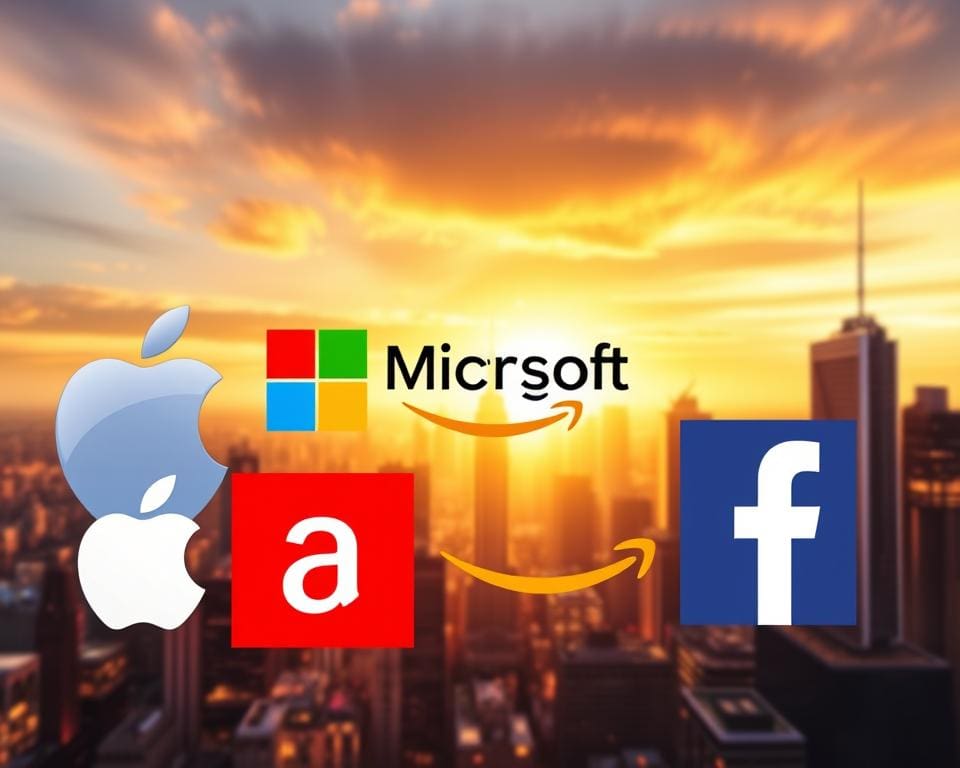In today’s rapidly evolving digital landscape, one cannot overlook the profound influence that large technology firms exert over our daily lives and the global economy. What are the Big Tech Companies, you may ask? These corporations, such as Apple, Google, Amazon, Facebook, and Microsoft, represent the pinnacle of technological innovation and market dominance. Their products and services not only enhance connectivity but also reshape consumer behaviour and drive economic growth across diverse sectors, including communications, entertainment, and retail.
The significance of these technology firms extends beyond mere financial metrics; they are at the forefront of a transformative era characterised by digitalisation. The innovations they introduce serve as cornerstones for subsequent advancements, marking a pivotal chapter in how we interact with technology and each other.
Understanding the Definition of Big Tech Companies
The landscape of business has evolved significantly with the rise of technology firms. These companies play a vital role in shaping the economy through innovation and development. Their influence extends beyond typical commercial boundaries, making their contributions essential in understanding the significance in today’s economy.
The Importance of Technology Firms in Today’s Economy
Technology firms are not merely commercial entities; they are the catalysts of modern economic growth. They create numerous job opportunities while nurturing entrepreneurial spirit. Through advancements in various industries, these companies enhance productivity and create innovative solutions that improve daily life. Individuals and businesses alike benefit from the connectivity and efficiencies these organisations provide.
How Big Tech Differs from Traditional Companies
Big Tech companies distinguish themselves from traditional businesses through the application of cutting-edge technologies. While conventional companies may concentrate on physical goods, technology firms leverage artificial intelligence, cloud computing, and big data to drive their operations. The scalability and market reach of these giants allow them to adapt swiftly to changing conditions. Their unique structures foster a new way of conducting business that has profound implications for society and consumer behaviour.

What Are The Big Tech Companies
The landscape of big tech is dominated by a select few organisations that have left an indelible mark on the industry. These leading tech corporations, characterized by their massive influence and vast resources, continue to shape the future of technology and innovation. Companies such as Google, Apple, Amazon, Microsoft, and Facebook epitomise what it means to be a major technology giant today.
An Overview of the Leading Tech Corporations
Each of these top tech companies has carved out a niche, driving progress through a combination of groundbreaking products and services. Google excels in search and advertising, offering tools that have become essential in daily life. Apple is renowned for its innovative hardware and software ecosystems. Amazon has transformed the retail sector with its extensive online marketplace and cloud computing services. Microsoft remains a staple in software development, continuously adapting to meet the needs of consumers and businesses alike. Facebook, with its social networking platform, has revolutionised communication and connectivity across the globe.
Key Characteristics of Major Technology Giants
Several traits define these major technology giants, setting them apart from their competitors:
- Investment in Research and Development: Leading tech corporations allocate substantial resources to R&D, ensuring continuous innovation.
- Utilisation of User Data: The ability to leverage user data for personalised services drives engagement and customer loyalty.
- Global Reach: These companies often operate on a worldwide scale, making their services accessible to billions.
- Rapid Growth and Adaptation: Their capacity to pivot quickly in response to market demands cements their position as industry leaders.
- Shaping Industry Standards: These companies influence best practices, setting benchmarks for quality and efficiency within the tech sector.
The Impact of Big Tech on Innovation and Society
The influence of big players in the tech industry extends far beyond profits. These firms drive innovation through extensive investments in technological advancements. Their efforts shape not only the marketplace but also the very fabric of society.
Driving Forces Behind Technological Advancements
Big Tech companies play a critical role in redefining what is possible through their pioneering solutions. Some key areas influenced by these giants include:
- Research and Development: Substantial funding leads to breakthroughs in various fields.
- Infrastructure: Innovations like cloud computing have transformed business operations.
- Artificial Intelligence: Advanced AI applications are reshaping industries and services.
The Role of Big Players in Tech Industry Progress
These corporations are not merely product creators; they foster a culture of innovation that encourages collaboration and growth across sectors. The impact these firms have on various facets of life includes:
- Workplace Dynamics: New tools and platforms change how teams collaborate and interact.
- Education: Access to technology creates new learning opportunities for students.
- Healthcare: Innovations enhance patient care and streamline processes.
Major Players in the Big Tech Landscape
As we delve deeper into the world of big tech, examining the profiles of top tech companies reveals their significant roles in shaping the industry. Each company not only showcases unique strategies but also holds substantial power in their respective markets. Understanding their market share is crucial in grasping their influence and the dynamics of the tech sector.
Profiles of Top Tech Companies
Leading firms such as Apple, Microsoft, Amazon, and Google exemplify the heights of innovation and market dominance. These companies have established themselves through a keen focus on research and development, catering to evolving consumer needs. For instance:
- Apple: Renowned for its premium devices and software services, Apple continues to maintain a significant market share in both mobile and computing sectors.
- Microsoft: Known for its software solutions, Microsoft’s cloud services have gained considerable traction, influencing various industries.
- Amazon: As a leader in e-commerce, Amazon’s market share extends beyond retail into sectors like cloud computing and streaming, reshaping consumer habits globally.
- Google: Dominating online search and digital advertising, Google is integral in shaping the current digital landscape.
Market Share and Influence in the Tech Sector
The market share of these tech giants is not just a reflection of their current standing but serves as a predictor of future trends. For example, Apple’s market share in smartphones speaks volumes about its brand loyalty and innovation strategies. Similarly, Amazon’s extensive share in e-commerce highlights its ability to adapt and expand continuously. As these companies grow, they not only influence market dynamics but also set the stage for emerging competitors.
Challenges and Controversies Faced by Big Tech Companies
Big Tech companies face a myriad of challenges that shape their operations and influence public perception. Regulatory scrutiny has surged as governments respond to concerns about monopolistic practices, data privacy, and ethical considerations. This scrutiny holds profound implications for the future of these technology giants.
Regulatory Scrutiny and Its Implications
As these firms expand, the challenges faced by big tech companies multiply, drawing significant attention from regulatory bodies worldwide. With increasing concerns about market dominance, regulators are imposing stricter compliance measures and investigating potential violations of antitrust laws. Such scrutiny can lead to hefty fines and restrictions on business practices, compelling companies to operate transparently and ethically.
Ethical Concerns and Public Perception
The implications of regulatory actions resonate deeply with consumers. Public perception of these companies hinges on their ability to address ethical issues such as data misuse, online misinformation, and the societal impact of automated technologies. As consumers demand accountability, the pressure intensifies for Big Tech to foster trust through responsible data handling and clear communication about their practices.
The Future of Big Tech and Emerging Trends
The future of Big Tech promises to be a landscape filled with innovation and transformative possibilities. As we advance into an era increasingly defined by technology, substantial investments in artificial intelligence and quantum computing are set to lead the way. These emerging trends will not only enhance operational models but also elevate technological capabilities, thereby reshaping how businesses interact with consumers and each other.
Moreover, as consumer behaviours shift towards sustainable practices, technology firms may find themselves under pressure to adopt ethical frameworks and environmentally friendly initiatives. Green technology is no longer just an option; it is becoming a necessity for Big Tech companies looking to secure their place in a conscientious marketplace. This focus on sustainability aligns with broader societal expectations that demand accountability and transparency.
Potential regulatory changes also loom large on the horizon, which could redefine operational frameworks within which Big Tech functions. Economies globally are still feeling the ripples of recent events like economic fluctuations and pandemics, prompting firms to rethink their strategies. The future of Big Tech is inherently dynamic, heralding a pivotal moment where these companies will continue to influence not just technological advancements, but also the very fabric of global society and economy.









